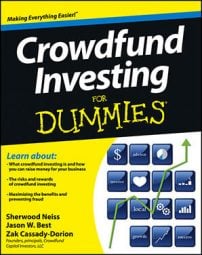Free labor for a business is a wonderful thing. If you’re in the pre-revenue stage of developing a crowdfund investing business, free labor may be the only thing keeping you moving forward! As you get ready to start a crowdfund investing campaign, you should definitely try to recruit some free labor so you can maximize the campaign’s effects without needing to work twice as many hours as you already do.
However, you must take pains not to exploit the people who step up to help you.
Campaign manager
Running a crowdfund investing campaign is a full-time job for at least two or three months. If you can’t afford to hire someone to take on the job of helping you run the campaign, reach out to your network to see if someone is willing to do the work for the experience only (no paycheck).
If you find someone willing to do so, be aware that she needs an incentive to put forth her best effort. For example, you may want to assure her that if your campaign is successful and she proves herself to be a solid manager, she’ll secure a job with your company.
Whether this person will be a long-term partner or not, be extremely careful to limit what you expect her to do. Keep her focused on the campaign management duties, and don’t ask her to pick up your dry cleaning, find a babysitter for your kids, or do any other non-campaign-related tasks.
Just because this person is a volunteer doesn’t mean you have carte blanche to demand her help with every aspect of your life. Avoid creating resentment; no one likes to feel taken advantage of. If your campaign manager starts to feel resentment, her communication with investors and potential investors (which is her number-one job) may reflect her attitude, which could spell disaster for your campaign.
Investor advisors
Tap the knowledge that your investors bring to the table. Doing so can add great value to your business. But always be aware that your investors have lives of their own and can’t devote countless hours to answering your questions and offering advice.
Just because your number-one priority is creating a successful business doesn’t mean that your investors share your sense of urgency. They have families, businesses, and jobs of their own; respect that what they can offer you is limited by the time they have available.
Ask investors if they’re interested in offering help and guidance. If someone says yes, find out what his expertise is, and request small amounts of help related to this expertise. Don’t overwhelm him, or he’ll feel exploited and will react by not helping out at all.

